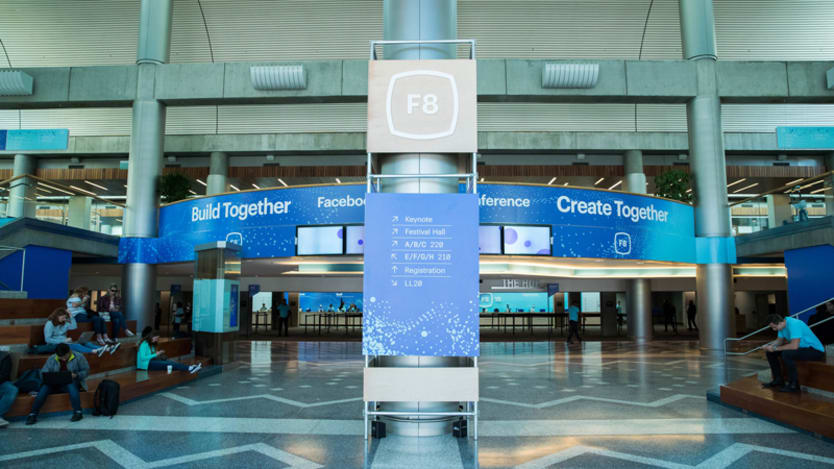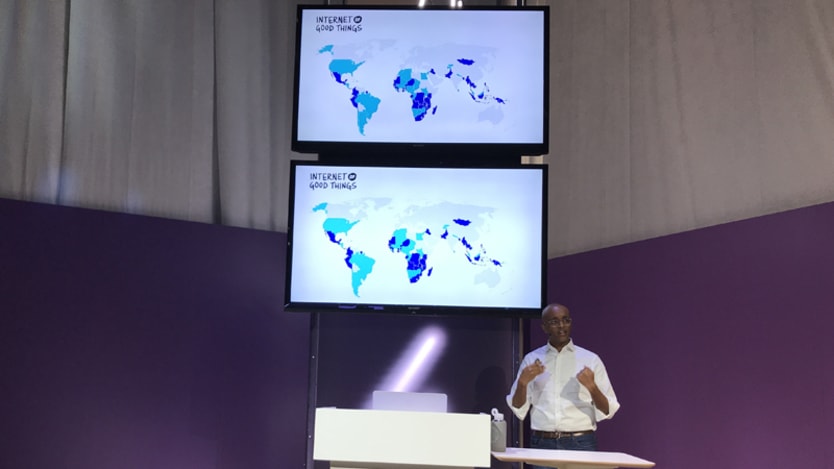
SAN JOSE, Calif. — At F8, Facebook’s annual developer conference, the company provided a number of updates related to its work on data for good and internet access, following weeks of uncertainty about the implications of privacy concerns for its work with NGOs and other partners.
On Tuesday, the company announced the launch of Blood Donations on Facebook, a new center to make it easier for people in India, Bangladesh, and Pakistan to find opportunities to donate nearby. Building on the launch of Crisis Response, a center on Facebook where people can access crisis response tools including Safety Check, Community Help, Fundraisers, and more, Facebook will also launch a new feature that will allow people who are affected by a crisis to share their firsthand accounts. These announcements came from Facebook’s chief product officer, Chris Cox, in a talk that also announced Facebook’s move into online dating, which was the news that seemed to capture the most interest beyond the walls of F8.
What the Facebook scandal means for 'data for good'
Responding to a public relations nightmare, Facebook has announced new measures to restrict data access. But what are the implications for partners in areas such as global health and disaster response?
Facebook is a frequent partner to NGOs working in global health, international development, and humanitarian response. This F8 had some higher stakes than conferences in years past as the social media giant and the organizations it partners with navigate how to handle widespread criticism around privacy and security on the platform. Some groups that have worked with the company have been concerned that partnering with Facebook could endanger their reputation, or risk the privacy of populations they serve.
“People come together to help each other in times of need on Facebook, and we build products to make that easier,” said Asha Sharma, head of product for Social Good at Facebook, which also released new tools for Facebook fundraisers last week. “We’re always listening and learning from our community to make sure we’re building tools they can use to do good in the world.”
Still, many of the sessions at the conference center in San Jose focused on technologies that may be distant for some of the emerging markets where Facebook usage is growing the fastest.
On Tuesday, Mubarak Imam, director of growth and analytics for WhatsApp, a messaging service that offers end-to-end encryption which Facebook now owns, spoke about the benefits that nonprofits are seeing in using the platform, mentioning, for example, how the Praekelt Foundation in South Africa is piloting a program called MomConnect that uses WhatsApp to provide mothers with critical pre and postnatal care. When Facebook bought WhatsApp, it also acquired a new way to reach users in emerging markets, where the service is popular in part because it’s a cheap replacement for SMS.
The loudest applause at F8 tends to be for the announcement of the giveaway for participants. This year, Facebook chief executive officer Mark Zuckerberg announced that every attendee would go home with an Oculus Go, a $199 virtual reality device. The idea behind the product is to provide an all-in-one headset at a more affordable price, in order to make VR more mainstream.
Of course, access and affordability mean something very different in Silicon Valley as opposed countries like India, home to the largest number of Facebook users, yet that is changing faster than some might expect.
A few sessions at F8 narrowed in on these growing markets, with a wide range of speakers from around the world talking about how they are leveraging Facebook products such as Messenger in their countries.
Judith Okonkwo, who is behind an extended reality lab in Lagos, Nigeria, talked about the potential impact of VR on education in Africa. She believes that immersing students into experiences makes lessons more accessible and tangible. She imagines how a VR kit — perhaps a low cost cardboard headset, VR on a mobile device, and solar charging capability — can provide a learning solution for children, including those living far from schools in internally displaced camps in Nigeria.
And on Wednesday, Facebook keynotes narrowed in on artificial intelligence, augmented reality, and connectivity. Facebook’s chief technology officer, Mike Schroepfer talked about developments in the company’s work to reach the 3.8 billion people around the world who do not have internet access. In Uganda, Facebook has partnered with local operators to bring new fiber to the region, to provide backhaul connectivity — an example of next generation technologies reducing the cost of connectivity.

Closer to home, in San Jose, California, Facebook is partnering with city officials to test an advanced Wi-Fi network supported by Terragraph, a wireless backhaul system optimized for dense urban areas. Upcoming trials are planned for Hungary and Malaysia. And Facebook is working with partners through the Telecom Infra Project, an initiative that brings together mobile network operators, infrastructure providers, and technology companies to build, test, and launch more infrastructure solutions like these.
Still, Facebook is running up against some major challenges in making its products and services mainstream in these markets.
In one session, Daniel Kopitchinski, a software engineer from Facebook, talked developers through ways to avoid losing users to broken experiences in emerging markets, where users often miss the latest mobile features due to issues ranging from constrained disk space to high data costs.
In the Developer Garage, a hub at the conference center where developers could talk about Facebook features, there was a station on Free Basics. News broke Tuesday, the first day of the two-day conference, that Facebook quietly shut down this free, curated web access in Myanmar, where United Nations investigators found the platform had been used to spread hate messages. Free Basics has ended in a range of countries, including Trinidad and Tobago, Papua New Guinea, and the Republic of the Congo, to name a few.
Still, amid the ongoing controversies, F8 presented an opportunity for Facebook’s partners to discuss how they leverage tools like WhatsApp and Facebook for good, particularly in some of the hardest places in the world to operate, where the reality on the ground is a stark contrast from this Silicon Valley setting.
Kidus Asfaw, partnerships manager for the office of innovation at the United Nations Children’s Fund, is one example.
When his team launched U-Report, an initiative to put youth voices at the center of UNICEF’s work in Uganda, Facebook was not widely used in the region. So UNICEF developed the messaging platform, but since then, services like WhatsApp have penetrated these markets and are available even on basic devices. Now, he said he is looking to Facebook not only for its technology, but also for support, for example when it comes to leveraging advanced technologies like chatbots and AI to better serve the 5 million young people who now use U-Report every day.
While acknowledging that it has been a challenge for some organizations to figure out the way forward on their partnerships with Facebook, he leaned toward the opportunity outweighing the risk.
See more related topics:
► What the Facebook scandal means for 'data for good'
► Facebook takes another step into crisis response
► Facebook to eliminate fees for donations to NGOs
► Facebook introduces disaster maps, announces early partners
► New Facebook philanthropy partner reflects trend toward long-term disaster response
“We are not a tech firm. We should not be competing with others in the private sector space. We should be clear, technologically articulate problem identifiers, and work with the right partners to solve those problems,” he said.
His message for Zuckerberg was that the people UNICEF serves face very different challenges than the people in the audience at F8, so the question becomes how to ensure that the technology provides equitable access to the poor, for services that may not be popular or profitable but are important and useful.
Zuckerberg said last month that Facebook is rethinking every aspect of every relationship it has, and taking a broader view of its responsibility to protect the privacy of its users.
At Devex World, Ebele Okobi, who has been called the secretary of state of Facebook for the African continent, will talk about her own work to help Facebook take on issues such as privacy concerns in these markets.
Stay tuned for continued Devex coverage of what changes at Facebook mean for partners in the NGO community.
Update, May 3: This story was updated to clarify details about U-Report.




